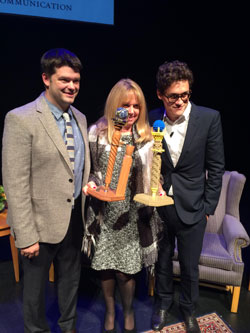Recently, the University announced it would pull out of an agreement with the faculty union to jointly conduct a gender salary equity study meant to examine and resolve faculty gender pay discrepancies, citing differences in the intended scope of the equity project. Instead the University plans to go forward with their own gender salary equity study without the faculty union. In doing so, they plan to look at the problem of gender salary differences in a vacuum, focusing narrowly on faculty salary differences within the same academic departments only. But gender salary inequity is a complex issue that cannot be studied in a vacuum. If Monmouth is to be an institution truly committed to finding a solution to closing the gender pay gap we must look at the entire scope of structural pay inequity for faculty. The University’s plan to conduct a study in a vacuum may have the appearance of a solution, but it’s not.
By contrast, the faculty union’s solution has been to start with a study that analyzes salary within and also across academic disciplines. This broader scope is necessary given what social science teaches us about how gender pay gaps actually happen. Gender pay gaps in the workplace are the result of unfair dynamics on multiple levels of social organization. At the individual level, men are often paid more than women for doing the exact same job. Yet, gender discrimination also happens at the institutional level in the form of the way certain jobs are classified and valued based on problematic and gendered assumptions about the nature of the work. Jobs that require listening, care work, and empathy skills associated with femininity are valued far less than occupations that require mathematical reasoning, competition, or profit maximization, stereotypically masculine traits. In higher education, that could mean that a university defines a faculty member in business, a masculinized field, as doing a different and more valuable job than a faculty member in nursing, a feminized field, even though both faculty members do the same work as professors. When faculty doing the same work are valued and compensated differently because of their gender or the gendering of their field this harms the faculty, students, and institution.
Pay inequity harms faculty by creating greater economic insecurity and burnout within certain inequitably paid disciplines. It harms students by allowing programs or schools to struggle with high faculty turnover and inconsistent staffing. It harms the institution through low retention and high turnover in inequitably paid disciplines, draining Monmouth of talented faculty and a sense of institutional history, culture, and pride. Frighteningly, this also threatens the accreditation of sought-after programs.
The union’s proposed study is important for faculty because it points to data we already know well, namely that feminized disciplines are paid far less. Based on a salary study conducted by expert faculty in 2021, we also know these larger patterns exist at Monmouth. The findings showed that faculty who teach in majors associated with masculine subjects and skills, such as accounting and finance, are paid on average $20,000 more at Monmouth than faculty who work in departments associated with femininity, such as nursing, health studies, special education and social work. In some cases, faculty in masculinized departments at MU are paid almost twice as much as their colleagues in feminized departments. These salary disparities impact men faculty at MU too as men professors in feminized majors experience lower salaries than all professors teaching in other academic areas on campus.
Despite these findings, the University has chosen not to examine salary differences across disciplines. Instead, the University has chosen the “market forces” argument to explain salary disparities between faculty who teach in different departments. If the university insists on the “market forces” argument, the faculty have a number of questions. First, if the market requires salaries in masculinized departments (like business) to be higher to attract talented professors to academia who could otherwise earn more outside of the university, then why are social work professors paid less on average than accounting professors when both can potentially be earning more outside of the university setting? Second, if by “market forces” the university means that the pay disparities we observe are simply a result of people’s individual choices to do certain kinds of jobs, some of which just happen to pay less, then why are all of the faculty in Monmouth’s nursing program women? And why would women in those fields “choose” to be paid less? Third, if the market argument assumes that some professors get paid more because their majors are just in greater demand, why are faculty in Health Studies, a department with some of the highest enrollment numbers on campus (and bringing in significant tuition dollars), also the lowest paid faculty on campus? If we look beyond the vacuum of the market argument, we see that the root of the problem is that we define “men’s work,” regardless of the gender of the people who do it, as valuable enough to reward with appropriate salaries, but have decided that “women’s work” can continue to be short-changed.
All faculty deserve the respect and dignity of pay equity. Here at Monmouth, all of our faculty, regardless of department, have been working tirelessly for two years to deliver a quality education to our students in the most extraordinary of circumstances. We must give special acknowledgement to Monmouth’s nursing, health studies, social work, special education, and professional counseling faculty who have been educating front line workers in professional programs so critical to our campus and to the larger community, especially during a national shortage of nurses and other essential health and community care professionals. Valuing our faculty in care work fields is vital to individual and community health in any period, but particularly in times like these when a global pandemic has further revealed the indispensable role that care work of all kinds plays in our lives.
The University can afford to pay for a solution to gender pay equity that begins with a closer examination of disparities within and across fields. The faculty union and the University came to an agreement in 2021 to study gender salary differences at Monmouth, but the University has now backed out of that agreement, rewriting the plan on their own terms to avoid a conversation about institutional inequality. We get why a study of institutional inequality is a tough one. It’s a big, difficult, and often scary public conversation, and one that feels like it could be too expensive to address. But it’s not. In assessing the costs of fixing gender salary inequity at MU, last summer the faculty proposed a remedy that would cost the University approximately 3.5 million to level up the faculty salaries in inequitably paid feminized fields. A solution the University rejected. Yet, for perspective, the University just spent 1.5 million this year alone to join the Colonial Athletics Association. We believe Monmouth should invest as much, if not more, in support of the academic mission of the University as they do in the athletic mission.
If Monmouth University wants to be a leader in taking real action to fix institutional inequalities, then it needs to engage in a conversation outside of a vacuum. The faculty are deeply invested in having a conversation about the importance of valuing faculty labor equally regardless of the gender of the professor, the gendering of their field, or the biases of the market. It’s up to the University to choose whether or not it will participate in a meaningful way.
Signed,
The Faculty Association of Monmouth University


